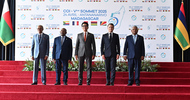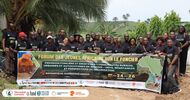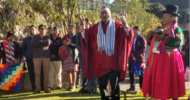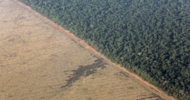With farms, ranches and rural communities facing unprecedented threats, a worrying trend leads to a critical question: Who owns the water?
- The Counter
-
04 January 2022
Whatever the merits, the extent or indeed the truth of the Great Arab Land Grab, it is now more or less history.
- The National
-
21 July 2016
The thriving market for land for commercial agriculture in East and West Africa is now seen as a threat to food security as rural populations are pushed off prime land.
- East African
-
07 August 2011
The truth is that if exploitation of a developing country’s natural resources by the West is colonialism, so it is when rich countries of the South do the same.
- The Daily Sun Star (Dhaka)
-
17 Mar 2009
The Global Convergence of Land and Water Struggles – West Africa invites you to join the West African Caravan for Land, Water and Seeds, which will mobilize 15 countries of the sub-region in March 2016
Youth leaders in the West Sepik Province spent the last 3 months of 2015, spreading the word on the importance of protecting their customary land and how land has been taken throughout the country through Special Agriculture Business Leases (SABL).
Members of the West African civil society and the Coalition for the Protection of African Genetic Heritage on Monday opened a regional forum on the impact of land grabbing on food security in Dakar
Water Asset Management has bought up thousands of acres of irrigated land across Arizona, California, Colorado and Nevada as well as pending deals in New Mexico and Texas.
The West African nation will let communities veto mining, farming and industrial projects. Activists say the legislation is a progressive landmark. At least one investor calls it unworkable.
A new video from WALHI documents the views of villagers in Bengkulu Province, on the west coast of Sumatra, who are resisting the expansion of palm oil on their lands.
"Western countries always say China is 'enclosing land' in Africa. In fact, China has not enclosed land in Africa; on the contrary I know that the west has enclosed a lot of land in Africa," says China's Director-General of African Affairs.
The 3rd edition of the West African caravan of the Global Convergence of Struggles for Land, Water and Seeds has commenced.
In an excerpt from his new book Why We Are Coming, author Yasin Kakande lays bare the truth about the Western exploitation of Africa that is the root cause of Africans choosing to leave their homelands.
The issue of land grabbing has been on the agenda for some years now, but it seems that the academic focus is changing.
The Beidahuang Group is rumoured to have leased out the majority of its 85,000 ha of WA farmland purchased or leased in a $200 million spending spree five years ago
- West Australian
-
10 August 2017
In the palm oil industry, image control is a means of survival, and what is said can be even more nefarious than what is done.
The Russian government has actively supported foreign investment in Siberian agriculture, making 1 million hectares of arable land in the Far Eastern Federal District available to foreign buyers
- The Diplomat
-
12 February 2019
The science and environment author discusses a growing global threat
The World Bank appears deeply torn. While the report endorses the Bank's open-door globalisation agenda, the sub-text dissents on every page.
- The Telegraph
-
12 September 2010
Local government in Indonesia’s West Papua province has revoked permits for 12 oil palm concessions that cover an area twice the size of Los Angeles after a recent audit of palm oil concession holders found widespread administrative and legal violations. Activists have called on the government to follow up on the revocation by granting Indigenous peoples access to the rescinded concessions instead of granting new licenses to other investors.
About 66 per cent of conflicts related to palm oil in West Kalimantan in the last two decades have yet to be resolved, according to a report recently issued by the Royal Netherlands Institute of Southeast Asian and Caribbean Studies (KITLV).
The oil palm industry’s rapid growth in West Papua, Indonesia is having serious adverse effects on its indigenous population.
Resource conflicts are building in the southernmost part of West Papua, as agribusiness companies stealthily invade the forests, leaving its people dispossessed.
- Asian Human Rights Commission
-
19 July 2012
Indigenous Papuans are reeling from the cut-price sale of the land and forests that are their lifeblood
Film by Reunion of Episcopal Conferences in West Africa shows how land grabbing and extractivism are depriving communities of their livelihood and making the fight for social justice increasingly urgent.
A comprehensive investigation into the oil palm industry in West Papua, by awasMIFEE and Pusaka and local Papuan organisations Belantara Papua, Bin Madag Hom, Jasoil, SKP KAME and Jerat.
Papua, and Sawit Watch.
Suitable land for palm-oil cultivation is running out in top producers Malaysia and Indonesia, which now account for about 85 percent of the global output. Wilmar is among several companies searching for land in West and Central Africa.
Around 100 Nagari Maligi residents (‘nagari’ means village in the local language) have been protesting for days at the Wilmar Group’s representative office in West Pasaman, Sumatra, Indonesia since March 9.
In May 2016, awasMIFEE published a story titled “The Salim Group’s secret plantations in West Papua”, about four concessions owned by the Salim Group in West Papua. A year and a half later, Salim Group is still aggressively expanding, and threatening more areas of remote Papuan forest.
- AwasMIFEE
-
07 February 2018
A caravan by the Global Convergence of Land and Water Struggles – West Africa will go across the region to get the voices of communities heard and engage national authorities to stop land grabbing
















